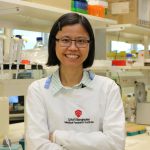
Dr Siok Tey,
Queensland researchers have shown it is possible to genetically engineer a cellular safety switch to make T-cell transplantation therapy safer in patients with haematological malignancies.
Scientists at the QIMR Berghofer Medical Research Institute have completed a phase I clinical trial using T-cells that have been manufactured to include the caspase 9 (iCasp9) cellular ‘switch’ that allows cells to be turned off if there is graft-versus-host disease.
T-cells with the iCasp9 safety switch can be rapidly eliminated by using an otherwise non-toxic small molecule drug AP1903
Conducted at the Royal Brisbane and Women’s Hospital by bone marrow transplant physician Dr Siok Tey, the trial involving three adult patients with blood cancers (two with AML and one with B-ALL) showed that iCasp9-transduced cells could persist long term and retain high in vivo clonotype proliferative capacity and function.
In the study, three patients undergoing myeloblative CD-34-selected haploidentical stem cell transplantation were treated with iCasp9-transduced cells generated at the manufacturing facility at QIMR Berghofer, Q-Gen Cell Therapeutics.
The iCasp9-transduced T-cells were readily detectable at four weeks post transfusion and remained at high levels in one patient alive at 3.6 years. And in one patient who developed Epstein Barr Virus associated lymphoproliferative disease (EBV-TLD) there was marked expansion (6-log) of iCaps9 T cells and cytokine release syndrome. The T cells contracted with the resolution of the EBV-TLD
Writing in Cancer Clinical Research, the researchers said the increasing use of T cell therapies such as CAR T cells came with the possibility of unexpected adverse events, hence the interest in safety switches to mitigate risks such as acute graft-versus-host disease (GVHD)
“Our findings provide added reassurance that the iCasp9 safety switch does not have any deleterious effects on the proliferative capacity or long-term persistence of transduced T-cells,” the researchers concluded.
Dr Tey said the findings would have promising implications for patients with haematological cancers who need a transplant but cannot undergo one because they do not have a suitably matched donor.
“The key to bone marrow transplantation is the immune cells. Immune cells are a double-edged sword – they are necessary for fighting cancer and infection but they can also cause GVHD.”
“In this clinical trial, for the first time in Australia, we used genetic engineering to make transplantation safer so we could use donors who were only partially matched.
“This immense capacity for rapid expansion was something that had not been shown before and really demonstrates the ‘power of one’: One cell, if it is the right cell, can grow rapidly and help control cancer or infection.”
“Our trial gives hope to all the people who haven’t been able to find a suitable bone marrow donor in the past.
The transplant unit has since transitioned transplant unit’s transition to a T-cell–replete haploidentical transplant approach using post-transplant cyclophosphamide.